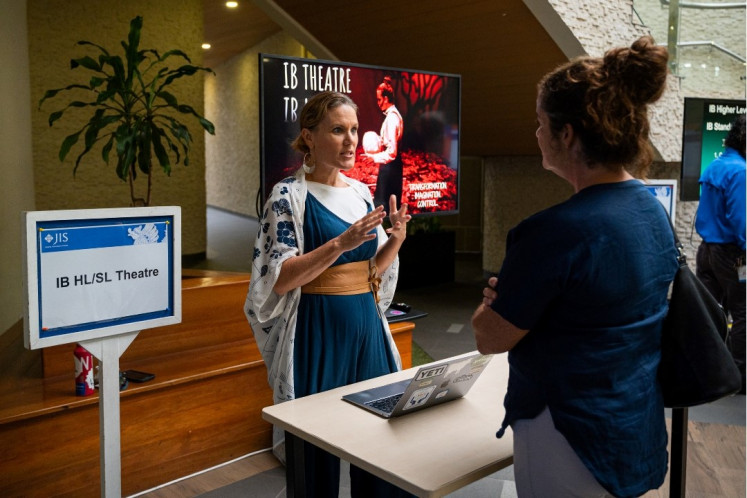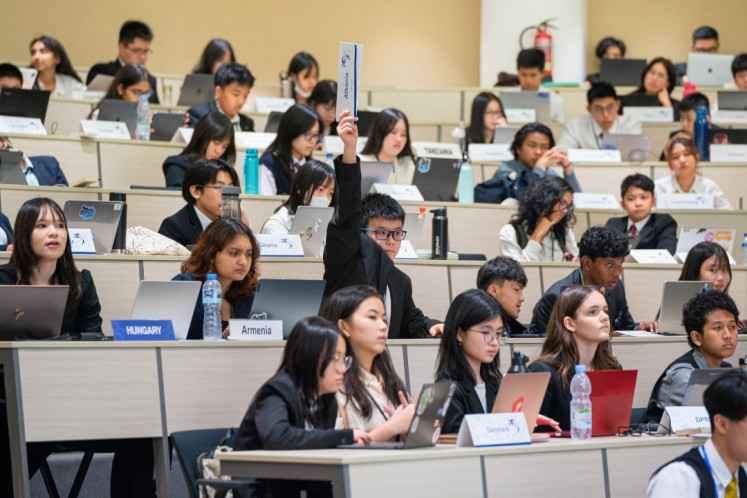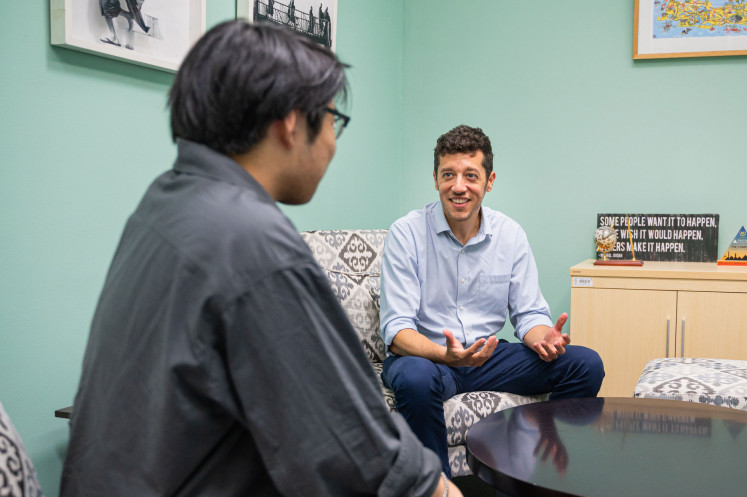Popular Reads
Top Results
Can't find what you're looking for?
View all search resultsPopular Reads
Top Results
Can't find what you're looking for?
View all search resultsWhat to look for in a high school to prepare your teen for University
Change text size
Gift Premium Articles
to Anyone
H
igh school is an important phase in every student’s academic journey, and for parents, it's a crucial time to make decisions that can significantly shape your teenager’s future. This is why the school you choose can play an instrumental role in preparing them for what lies ahead.
“It’s not just about academics; it's about choosing a learning environment that fosters intellectual curiosity, encourages personal growth, and equips students with the necessary skills for university and beyond,” says Edward Wexler, the high school principal of Jakarta Intercultural School (JIS). “It's also about finding a space where your child can feel supported and motivated to explore their full potential and deepen their understanding of the world.”
To help parents navigate their search, Wexler and JIS’s experienced team of high school counselors highlight the following four key offerings a school should have to best prepare their teenagers for graduation and success at university.
Diverse range of subjects
In addition to the accepted core subjects of English, mathematics and science, a broad and diverse variety of courses serves more than a student’s academic needs. From modern languages and social sciences to computing, sports and the performing arts, these learning opportunities promote the exploration of various fields of study, giving students a multitude of avenues to discover their interests.
“As they try these different subjects, they begin to learn more about themselves, what they are really passionate about, and what they are capable of,” says Wexler. “When the time comes, they will have the full resolve and confidence to decide on a university major — and even a focused career path to pursue.”
(Photos accreditation: JIS documentation)A diverse academic background also nurtures critical thinking and problem-solving skills, which are valuable strengths in any setting, whether that be educational, personal or professional, he adds.
JIS high school counselor Joe Tavares further underlines the importance for schools of personalizing each student’s curriculum and striving to align them with their personal goals and university ambitions. A varied spectrum of subjects ensures both can be implemented at the highest level.
“At JIS, for example, students can take every single math class in the IB [International Baccalaureate] and AP [Advanced Placement] programs, which ensures they can take the best-fit courses and be better prepared to study majors that require university-level math,” Tavares explains. “We offer many language courses, including various levels of Bahasa Indonesia, French, Japanese, Korean, and Spanish. We also have many creative arts courses; JIS students can act, dance, draw, paint, and play music while they take other academic classes.”
Such breadth, he says, ensures all students can be appropriately challenged and learn at the highest level to fully prepare them for their journey after high school.
Plenty of extracurricular opportunities
While academic performance remains one of the top considerations universities use in a student’s application process, it is widely accepted that they also place a high value on extracurricular activities.
“What they look for are multifaceted, well-rounded individuals with diverse interests and experiences,” Wexler says. “Extracurriculars are a fantastic, wholly effective way of fostering these traits. Furthermore, extensive research has shown that engaging in extracurricular activities builds essential life and leadership skills, boosts confidence, develops responsibility and resilience, and greatly benefits mental and physical health.”
Whether it’s through after-school language or arts and crafts clubs, service-learning campaigns or sports competitions, students who participate in extracurricular engagements tend to show greater academic achievements, character and social development and community involvement (Christison, 2013).
JIS is a passionate proponent of this approach to balanced education and growth, Wexler adds, urging parents to look for a school that understands the significance of extracurricular involvement and provides a rich array of activities to cater to their child’s diverse interests and talents.
Internationally recognized pathway programs
Curriculum frameworks like IB and AP are known for their academic rigor. They are expertly designed to prepare high school students for the intense challenges of university coursework and expectations, cultivating critical thinking, research and writing skills while promoting reflective, self-driven learning. In fact, IB and AP courses demand the same elevated workload and expectations as universities.
Research conducted by IB further suggests that IB students have a greater chance of successfully completing their undergraduate degrees than their peers, and they are more likely to be involved in various aspects of university life.
“By taking on IB or AP, students demonstrate that they are willing to challenge themselves, and that is an attribute that universities around the world hold in high regard,” says JIS high school counselor Abigail Wilson.
As one of the few international schools in Indonesia to offer both IB and AP courses, as well as their two-year diploma programs, JIS allows students to mix and match courses from both as best needed for their individual learning goals.
“JIS students can take the full IB Diploma Program, the IB Career-Related Program, the full AP Capstone, a full slate of IB courses, a full slate of AP courses, or a mix of both IB and AP courses; thus, JIS offers multiple university-level pathways,” explains Wilson. “That flexibility is something that sets JIS apart from other schools.”
Whether your child chooses to take IB or AP courses, or a combination of both, they will not only gain a competitive edge in their university admissions process, but also in their academic, curricular and even professional experiences after graduation.
Counselors to offer support and guidance
School counselors play a critical role in guiding students as they navigate their academic journey toward university. They help students understand their strengths, interests and aspirations, and support them in creating a tailored pathway program of courses that aligns with their goals for university.
As an experienced counselor himself, Tavares underlines the importance of schools taking every measure to ensure students understand the course choices they have available to them. This can take the form of regular one-on-one guidance sessions with families starting as early as grade 10.
“With JIS families, for example, counselors discuss whether they want to take AP courses, IB courses, JIS-developed courses or a mixture of multiple curricula,” he says. “When students get to grade 11 and grade 12, they are faced with literally hundreds of course combinations. I believe JIS families really appreciate the academic advice we provide them with to ensure they are choosing the right courses."
Counselors also provide invaluable support during the university search and application process, offering advice on university choices and guiding students through the application process.
“This process can be mired with complexities,” Wexler explains, referring to multi-tiered requirements such as essays, interviews, standardized tests and grade transcripts to list just a few. “Individualized support empowers students — and their parents — to navigate their journey with confidence.”
(Photos accreditation: JIS documentation)Choosing a school with a solid team of qualified high school counselors significantly helps ease the process for you and your child, he adds, as they will be on hand to ensure you complete every necessary step.
Additionally, many international schools like JIS will take the extra step of nurturing a close relationship with universities from around the world and connecting with those students are interested in. Their counselors use these invaluable resources to organize university fairs throughout the academic year, enabling students to speak directly with representatives to gain a better, more concrete understanding of the university experience that may await them.
"JIS students apply to and are accepted to hundreds of universities each year — in the United States, Canada, the United Kingdom, South Korea, Netherlands, Japan, Singapore, Indonesia and other countries all over the world,” Mr. Tavares says. “Consequently, hundreds of universities come to our campus each year.”
According to the College Board, universities take into account more than a student’s grade point average or test scores; they also value personal accomplishments, values and goals. They look for well-prepared, globally minded students who are going to be involved in school life as musicians, athletes, artists, entrepreneurs, scientists and everything in between and beyond.
Offering a final piece of advice to parents, Wexler says: “By choosing the right school, or a school that is the best fit for your child, you can ensure your child is not just prepared for university, but is empowered with all the academic and social-emotional skills they need to thrive.”
Find out how JIS students achieve academic and personal success through JIS High School pathway programs.














